EXTREME PERIOD FATIGUE.

What causes extreme fatigue during your period?
Many women experience varying levels of fatigue during their period, most often caused by heavy menstrual bleeding. Whilst this is perfectly normal, for some women period fatigue symptoms are more severe and last much longer than the average. In fact, a survey conducted by Active Iron found that 18% of women said their menstrual fatigue lasted longer than seven days¹. This in turn can impact their daily routine, health, and wellbeing. In this article on extreme period fatigue, we’ll provide information and answers to the following:
- Fatigue during your period explained
- What causes extreme period fatigue
- Signs of extreme period fatigue
- How to deal with extreme fatigue during your period
- Extreme period fatigue and iron supplements
- When to see a doctor about extreme period fatigue
Fatigue during your period explained
Fatigue before and during your period is a very common experience for many women, and is a recognised symptom of PMS. During the second half of the menstrual cycle, oestrogen levels reach their peak and them fall quickly, and this can make you feel sluggish, tired, and fatigued. A decline in the serotonin levels at this time, as well as low iron levels, also contributes to a low mood and energy levels. Combined with other symptoms, like cramps or bloating, menstrual fatigue can really make this time of the month seem insurmountable. 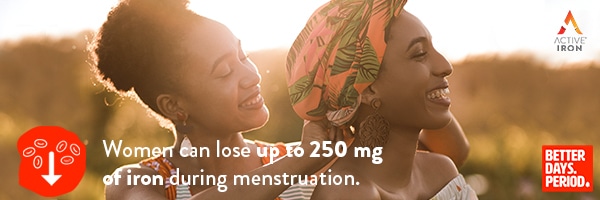 Women can lose up to 250mg of iron during their menstrual cycle, and iron plays a key role in supporting a healthy immune system, maintaining energy levels, and transporting oxygen via red blood cells. Taking an iron supplement, such as Active Iron, is a great way to address low iron levels throughout menstruation, and help keep pre-period fatigue at bay. 64% of women surveyed said that they experienced menstrual tiredness and fatigue during their cycle, so keeping iron levels up can prove a significant boost to energy.
Women can lose up to 250mg of iron during their menstrual cycle, and iron plays a key role in supporting a healthy immune system, maintaining energy levels, and transporting oxygen via red blood cells. Taking an iron supplement, such as Active Iron, is a great way to address low iron levels throughout menstruation, and help keep pre-period fatigue at bay. 64% of women surveyed said that they experienced menstrual tiredness and fatigue during their cycle, so keeping iron levels up can prove a significant boost to energy. 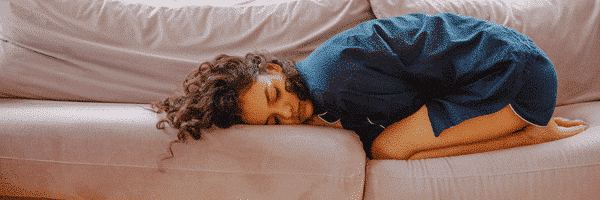
What causes extreme period fatigue?
Sometimes, the amount of fatigue experienced by a woman during menstruation exceeds that which is seen as “normal,” and this is known as extreme period fatigue. This can be caused by a number of reasons, some of which include:
- PMS – Premenstrual mood disorder can cause an individual to be more likely to experience sleep disturbances like insomnia, hypersomnia, and fatigue
- PCOS – Polycystic Ovary Syndrome is another condition which leads to sleep disordered breathing like sleep apnoea, which impacts sleep quality
- Low iron levels – Iron is responsible for the production of red blood cells in our body, which leads to energy levels; low iron can cause menstrual fatigue
- Food cravings – During your period, many people experience food cravings, and specific foods—or eating too much—can cause a spike in blood-glucose levels, and subsequent crashes
In this case—especially exacerbated by heavy bleeding—many women experiencing extreme fatigue with periods will consult their GP, as it could be the sign of an underlying condition like PCOS or low iron levels. 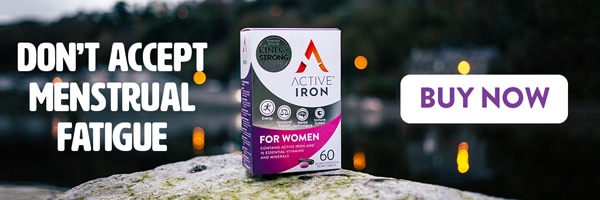
Signs of extreme period fatigue
Paragraph: Detail the signs and symptoms to look out for to distinguish extreme period fatigue. Differentiate the signs of regular period fatigue versus extreme period fatigue that readers should be aware of to know if they need to take action (i.e taking an iron supplement). Signs of extreme period fatigue include:
- Low mood
- Inability to sleep
- Feeling tired after waking up
- Needing multiple cups of coffee to get the day started
- Feeling unable to complete normal tasks due to fatigue
- Skipping out on leisure activities
- Difficulty concentrating or thinking clearly
- Sluggish movements
While some fatigue is common throughout menstruation, extreme period fatigue manifests much longer than what is expected (1-3 days), and can carry all the way to a week of feeling tired and sluggish. In these cases, it’s important to look for some relief, such as taking an iron supplement like Active Iron to help replenish iron and energy levels. 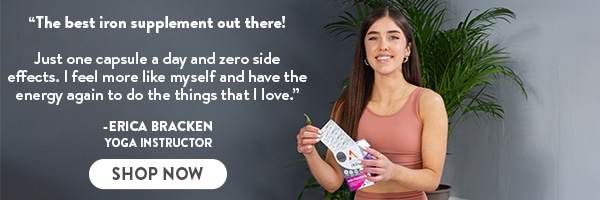
How to deal with extreme fatigue during your period
Managing extreme fatigue on your period can help bring relief, and the good news is that there are ways to improve your energy levels at home. Follow our nine tips for relieving period symptoms including fatigue here, and take a look at the following:
Follow a balanced sleep schedule
Going to bed at the same time helps regulate the hormone which induces sleep, and can help lead to more restful sleeps throughout your menstrual cycle. Try to avoid screen time before bed (easier said than done!) as this will further help your circadian rhythm.
Eat a healthy, balanced diet
You are what you eat, and ensuring your body has the right proteins and nutrients during menstruation can help ease symptoms like extreme period fatigue. It’s tempting to reach for a bar of chocolate and curl up on the couch, but foods high in sugar only cause energy crashes after the high wears off. Drink plenty of water and focus on eating more fruits, vegetables, and wholegrains. 
Take an iron supplement
Did you know that menstruation is the leading cause of iron loss worldwide? Blood loss from periods can cause low iron levels, and iron is responsible for red blood cell and energy production in the body. Taking an iron supplement such as Active Iron consistently throughout your cycle can help increase your iron and energy levels, helping you to feel more energised and alert. 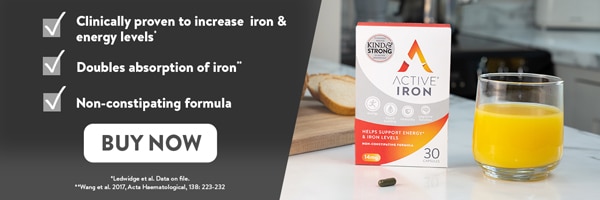
Exercise
It may seem counter-intuitive to move your body more when you’re feeling less energised, but even small amounts of daily exercise are shown to boost your energy levels. Exercise releases endorphins, which naturally boost your energy levels, and can also help with other PMS symptoms. If you’re not good at getting yourself to the gym, consider enlisting a friend to join you for regular walks around the neighbourhood. It will help motivate you, and keep you adhering to a consistent schedule!
Drink more water
Staying hydrated is good advice for most of life’s problems, but dehydration is especially notorious for causing low energy levels. Going to bed dehydrated can impact your sleep schedule, leading to dry mouth and nasal passages, snoring, and cramps. Keep a full water bottle on your bedside table and remember to sip throughout the day, too!
Give yourself the time to relax
Life is a whirlwind, and sometimes we don’t allow ourselves, or simply don’t have the time, to relax. 60% of women surveyed about their menstrual symptoms said that finding the time to rest and relax significantly improved their quality of life during their period. However you can make it possible, building a little extra “you” time into your schedule can help combat fatigue before periods
Extreme period fatigue and iron supplementation
Women can lose up to 250mg of iron during her menstrual cycle, and iron plays a key role in supporting a healthy immune system, maintaining energy levels, and transporting oxygen via red blood cells. Taking an iron supplement, such as Active Iron, is a great way to address low iron levels throughout menstruation, and help keep extreme fatigue from periods at bay. 64% of women surveyed said that they experienced menstrual tiredness and fatigue during their cycle, so keeping iron levels up can prove a significant boost to energy. 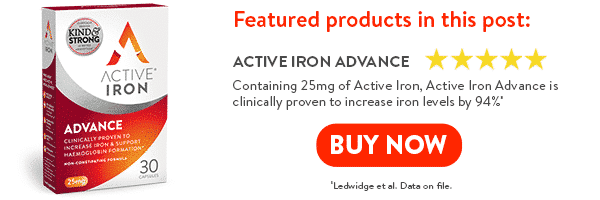
When to see a doctor about extreme period fatigue
Sometimes, simply allocating more time for rest and eating healthy isn’t enough to bring your energy levels back up from extreme menstrual fatigue, and in that case it’s worth it to turn to the field of medical intervention. Blood loss from periods results in iron loss, which directly affects energy levels. Especially for those on restricted diets, like vegetarians, it can be difficult or downright impossible to keep iron levels where they should be. Because of this, many women who menstruate regularly turn to iron supplementation to ensure their iron is kept to optimal levels. Knowing which iron supplement to rely on can be tricky, as they vary in strength and efficacy. Active Iron is clinically proven to deliver highly-absorbed iron², meaning it increases iron levels and helps avoids the gastrointestinal side effects usually associated with iron supplements³. Active Iron Advance delivers 25mg of iron in each one-a-day capsule, a great option for those who experience low iron levels on a regular basis. Active Iron Women offers 17mg of iron for those looking for a slightly lower dosage, alongside a multivitamin specially formulated with women’s health in mind. When all else fails, always consult your GP or healthcare professional to ensure you are getting the care which is right for you and your extreme fatigue while on your period.  ¹Survey conducted by Active Iron and 3Gem with 2,400 women in Ireland and the UK ²Wang et al. 2017, Acta Haematological, 138: 223-232 ³Ledwidge et al. Data on file.
¹Survey conducted by Active Iron and 3Gem with 2,400 women in Ireland and the UK ²Wang et al. 2017, Acta Haematological, 138: 223-232 ³Ledwidge et al. Data on file.
